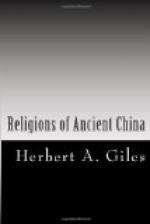The Hsing ying tsa lu has the following story. There was once a very poor scholar, who made it his nightly practice to burn incense and pray to God. One evening he heard a voice from above, saying, “God has been touched by your earnestness, and has sent me to ask what you require.” “I wish,” replied the scholar, “for clothes and food, coarse if you will, sufficient for my necessities in this life, and to be able to roam, free from care, among the mountains and streams, until I complete my allotted span; that is all.” “All!” cried the voice, amid peals of laughter from the clouds. “Why, that is the happiness enjoyed by the spirits in heaven; you can’t have that. Ask rather for wealth and rank.”
Good and Evil.—It has already been stated that the Chinese imagination has never conceived of an Evil One, deliverance from whom might be secured by prayer. The existence of evil in the abstract has however received some attention.
Wei Tao Tzu asked Yu Li Tzu, saying, “Is it true that God loves good and hates evil?”
“It is,” replied Yu.
“In that case,” rejoined Wei, “goodness should abound in the Empire and evil should be scarce. Yet among birds, kites and falcons outnumber phoenixes; among beasts, wolves are many and unicorns are few; among growing plants, thorns are many and cereals are few; among those who eat cooked food and stand erect, the wicked are many and the virtuous are few; and in none of these cases can you say that the latter are evil and the former good. Can it be possible that what man regards as evil, God regards as good, and vice versa? Is it that God is unable to determine the characteristics of each, and lets each follow its own bent and develop good or evil accordingly? If He allows good men to be put upon, and evil men to be a source of fear, is not this to admit that God has His likes and dislikes? From of old until now, times of misgovernment have always exceeded times of right government; and when men of principle have contended with the ignoble, the latter have usually won. Where then is God’s love of good and hatred of evil?”
Yu Li Tzu had no answer to make.
The Tan yen tsa lu says, “If the people are contented and happy, God is at peace in His mind. When God is at peace in His mind, the two great motive Powers act in harmony.”
Where is God?—The Pi ch’ou says, “The empyrean above you is not God; it is but His outward manifestation. That which remains ever fixed in man’s heart and which rules over all things without cease, that is God. Alas, you earnestly seek God in the blue sky, while forgetting Him altogether in your hearts. Can you expect your prayers to be answered?”
This view—“For behold, the kingdom of God is within you,” St. Luke xvii. 21,—has been brought out by the philosopher Shao Yung, A.D. 1011-1077, in the following lines:—
The heavens are still:
no sound.
Where then shall God
be found? . . .
Search not in distant
skies;
In man’s own heart
He lies.




